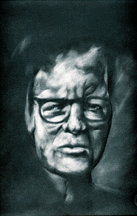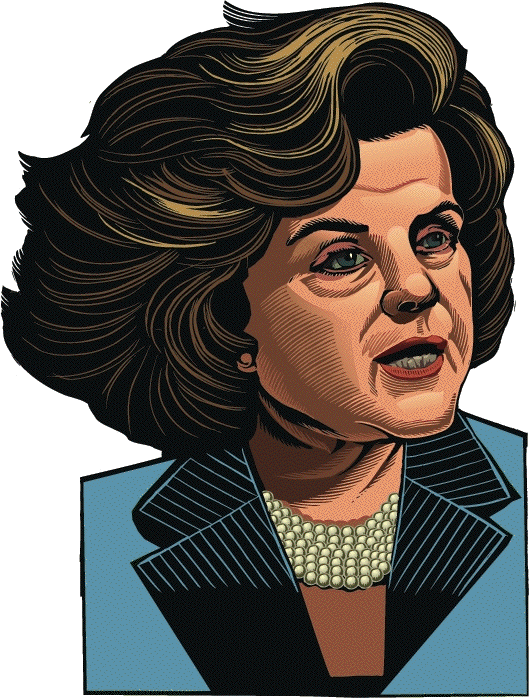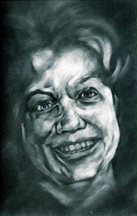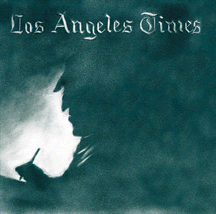
by Don B. Kates
To understand the Gun Control Movement requires recognizing that at its core lies the belief that it is barbaric for an individual even to have--much less use--arms for self-defense.
 |
 |
 |
|
"I don`t believe that everybody in America needs to be able to buy a semi automatic or fully-automatic weapon, built only for the purpose of killing people, in order to protect the right of Americans to hunt and practice marksmanship and to be secure." President Bill Clinton |
"We would like to see, in the future, what we will probably call needs-based licensing of all weapons. ...Where it would make it much more difficult for anybody to be able to purchase handguns...." Sarah Brady speech to the Women`s National Democratic |
"Every civilized society must disarm its citizens against each other." Garry Wills |
 |
 |
 |
|
Feminist icon Betty Friedan denounces "the trend of women buying guns" as "a horrifying, obscene perversion of feminism." Friedan believes "that lethal violence even in self-defense only engenders more lethal violence, and that gun control should override any personal need for safety." "Are You Safer With a Gun?" |
"If I could have gotten 51 votes in the Senate of the United States for an outright ban [on "assault weapons"], picking up every one of them, Mr. and Mrs. America turn them all in, I would have done it." Sen. Dianne Feinstein (D-CA) |
"Ban the things. Ban them all." Molly Ivins |
 |
 |
|
"Passing a law like the assault weapons ban is a symbolic--purely symbolic--move. ... Its only real justification is not to reduce crime but to desensitize the public to the regulation of weapons in preparation for their ultimate confiscation." Charles Krauthammer |
"...The Times supports a near-total ban on the manufacture and private ownership of handguns and assault weapons, leaving those guns almost exclusively in the hands of law enforcement officials. Under our plan, individuals could own sporting weapons only if they had submitted to a background check and passed a firearms safety course. Other special, closely monitored exceptions could be made, such as for serious collectors." Los Angeles Times, |
Consistently, over more than three decades, the Gun Control Movement has promoted "moral" opposition to the individual right of self-defense. To understand the Gun Control Movement requires recognizing that at its core lies the belief that it is barbaric for an individual even to have--much less use--arms for self-defense.
In this respect, those who dominate the organized Gun Control Movement differ vastly from people and legislators who may support a particular gun law in the (often naive) belief that it will curb crime. Though often presented in the guise of crime control, the Gun Control Movement`s fundamental concern is to impose its morality on those who believe in the fundamental right of self-defense.
Typical is nationally syndicated columnist Garry Wills. In column after column for over two decades he has reviled gun owners as "anti-citizens" arming "against their own neighbors," "gun fetishists," "traitors," "enemies of their own patria." As one of his columns puts it, "Every handgun owned in America is an implicit declaration of war on one`s neighbor." In another, Wills denounces "individual self-protection" as "anti-social behavior," declaring that "every civilized society must disarm its citizens against each other."1
Liberal columnist Molly Ivins agrees, and it is one of the few things on which conservative columnist Charles Krauthammer sees eye to eye with Ivins and Wills. Krauthammer supports the "assault weapon" ban not as a crime control measure--he concedes it will have negligible impact on crime--but as a step toward accustoming Americans to the moral imperative for banning and confiscating all firearms.2
The same general view has been endorsed on religious grounds by a leading representative of the Board of Church and Society of the United Methodist Church (which is one of several quite different Methodist denominations in the U.S.). The Board has long been the force behind the National Coalition to Ban Handguns (which has now been renamed the Coalition Against Gun Violence (CSGV) to emphasize that it seeks to ban not just handguns but any long gun designed primarily for self-defense.)
Rather than shooting rapists, it is women`s Christian duty to submit to rape, according to an article by Reverend Allen Brockway, editor of the official magazine of the Board of Church and Society of the United Methodist Church. He poses the rhetorical question, "Is the Robber My Brother?" and Reverend Brockway answers, "Yes."
Rev. Brockway recognizes that the woman who is accosted in the park may not think of her violator as her neighbor, or that his "safety is of immediate concern"--but, Brockway preaches, "Criminals are members of the larger community no less than are others. As such, they are our neighbors or, as Jesus put it, our brothers. . . . [Though violent criminals act wrongfully,] it is equally wrong for the victim to kill the robber or burglar, save in those extremely rare circumstances when the unambiguous alternative is one own`s death."3
Such views are not just an atypical product of sexism or religious extremism. They characterize the Gun Control Movement. Feminist icon Betty Friedan denounces "the trend of women buying guns" as "a horrifying, obscene perversion of feminism." Friedan believes "that lethal violence even in self defense only engenders more lethal violence, and that gun control should override any personal need for safety."4
Likewise, then-New York Governor Mario Cuomo said Bernhard Goetz was morally wrong in shooting the men who attacked him in the subway even if the shooting was clearly necessary to resist robbery: "If this man was defending himself against attack with reasonable force, he would be legally [justified, but] not morally."5
Similarly, the Washington Post has denounced "the need that some homeowners and shopkeepers believe they have for weapons to defend themselves" as representing "the worst instincts in the human character."6
As Governor of Massachusetts, Michael Dukakis declared: "I do not believe in people owning guns, only police and military. I am going to do everything I can to disarm this state."7
Former Attorney General Ramsey Clark calls gun ownership an insult to America: "A state in which a citizen needs a gun to protect himself from crime has failed to perform its first purpose." Clark denounces this kind of society as a return to barbarism, and anarchy, "a jungle where each relies on himself for survival."8
"The only reason for guns in civilian hands is for sporting purposes," says HCI Chairperson Sarah Brady. Likewise, when asked in an interview about the legitimacy of handguns, her husband James Brady answered: "For target shooting, that`s ok. Get a license and go to the range. [But not] for defense of the home--that`s why we have police departments."
Sarah Brady put it even more forcefully in a September 21, 1993, speech to the Women`s National Democratic Club: "We would like to see, in the future, what we will probably call needs-based licensing of all weapons. ...Where it would make it much more difficult for anybody to be able to purchase handguns...."
Handgun Control, Inc. (HCI) has no religious connection and claims to be more moderate than CSGV, but marches to the same drummer: that it is antisocial to own a firearm for self-defense. HCI`s ultimate goal is federal gun licensing under which self-defense would not be an acceptable ground for gun ownership; only sportsmen and sportswomen would be allowed to own guns.9
The Los Angeles Timesagrees that federal law should limit ordinary people to "ownership of sporting and hunting weapons" only:
"Under our plan, individuals could own sporting weapons only if they had submitted to a background check and passed a firearms safety course. Other special, closely monitored exceptions could be made, such as for serious collectors."10
A Difference in Degree
Taking a closer look at statements of anti-gun attitudes reveals, interestingly, some differences--but only as to "how much" gun control they demand. Reverend Brockway, quoted above, would allow a woman to shoot her rapist if she somehow "unambiguously" knew her rapist was going to kill her afterwards. The Presbyterian Church USA would not. It condemns taking a criminal`s life under any circumstances whatsoever.
In a statement urging Congress to ban handguns, the Presbyterian Church USA`s representative, Reverend Kathy Young, stressed that the General Assembly of the Presbyterian Church USA "has declared in the context of handgun control and in many other contexts, that it is opposed to `the killing of anyone, anywhere, for any reason.`" Rev. Young said the Church has no objection to hunting guns (long guns) owned for "sports." She said that what the General Assembly condemns are "weapons of death," that is, "handguns" kept for self-defense or criminal misuse. The Church condemns both equally: "To be opposed to killing is to be opposed to the instruments that make killing possible, that are designed solely for the purpose of killing;" and "There is no other reason to own a handgun (that we have envisioned, at least) than to kill someone with it."11
Senator Dianne Feinstein (D-CA) would not just stop sales of supposed "assault weapons"; she would confiscate all those already owned: "If I could have gotten 51 votes in the Senate of the United States for an outright ban, picking up every one of them, Mr. and Mrs. America turn them all in, I would have done it."12
Yet this is less extreme than those urging the confiscation of all guns--the views of people such as Krauthammer and Ivins ("Ban the Things. Ban Them All.").
Calling for a complete gun ban, the Detroit Daily Press editorialized: "No private citizen has any reason or need at any time to possess a gun. This applies to both honest citizens and criminals. We realize the Constitution guarantees the `right to bear arms,` but this should be changed."13
Echoing the cry is the New York Times: "One way to discourage the gun culture is to remove the guns from the hands and shoulders of people who are not in the law enforcement business."14
Dr. Katherine Christoffel, who heads her own medical anti-gun group, has said, "Guns are a virus that must be eradicated.... They are causing an epidemic of death by gunshot, which should be treated like any epidemic--you get rid of the virus.... Get rid of the guns, get rid of the bullets, and you get rid of the deaths."15
Anti-gun advocates may differ in how much gun control they advocate, but they are united in believing that guns must be removed from the hands of the people for "moral" reasons. Since they see guns as the primary mechanism that facilitates self-defense, they would discourage self-defense by banning guns.
An outgrowth of this point of view is the law that HCI and CSGV succeeded in having adopted by the District of Columbia in 1976: Householders may not buy handguns, nor may guns of any type be kept assembled or loaded for self-defense.16 It was under these laws that the District achieved its dubious honor of being known as the "murder capital" of America, yet HCI continually urges cities and states to pass this same law, trumpeting again and again that "the only reason for guns in civilian hands is for sporting purposes."
In a free society, the only legitimate basis for law is controlling dangerous behavior, not imposing a minority moral vision on the majority. The great majority of Americans, whether gun owners or not, reject the anti-gun "moral vision" and accept self-defense as full justification for gun ownership by law-abiding, responsible adults. That is why gun control advocates generally soft-pedal their elitist "moral" agenda, blending it into false and misleading arguments about crime control.
1 These quotations are taken from the following Wills columns: "The Terrorists Who Pack an NRA Card," Albany Times Union, Apr. 22, 1996; "NRA is Complicit in the Deaths of Two Children," Detroit Free Press, Sept. 6, 1994; "...Or Worldwide Gun Control?" Philadelphia Inquirer, May 17, 1981; "Handguns That Kill," Washington Star, Jan. 13, 1981; and "John Lennon`s War," Chicago Sun-Times, Dec. 12, 1980.
2 See, e.g., Charles Krauthammer, "Disarm the Citizenry," Washington Post, Apr. 5, 1996, and Molly Ivins, "Ban the Things. Ban Them All," Washington Post, Mar. 16, 1993.
3 Brockway, "But the Bible Doesn`t Mention Pistols," Engage/Social Action Forum, May, 1977, pp. 39-40. This article also has been published in a separate pamphlet by the Board of Church and Society of the United Methodist Church, titled Handguns in the United States. The Board of Church and Society of the United Methodist Church, one of several Methodist denominations in the U.S., founded the Coalition to Stop Gun Violence (CSGV), one of the two major national anti-gun groups. The Board was CSGV`s official fiscal agent until gun lobby complaints to IRS threatened the Church`s tax exemption. CSGV still shares the Board`s Washington, D.C., building and the Board remains a part of CSGV`s coalition.
4 Betty Friedan, quoted in "Are You Safer With a Gun?" by Ann Japenga, Health, March/April 1994, p. 54.
5 Newsweek, Jan. 7, 1985 (emphasis added).
6 "Guns and the Civilizing Process," Washington Post editorial, Sept. 26, 1972.
7 See the cover of the Oct., 1988, American Rifleman, quoting a statement Michael Dukakis made on June 16, 1986.
8 R. Clark, Crime in America 88 (Simon & Schuster 1971).
9 Interview with James Brady, Parade, June 26, 1994; interviews with Sarah Brady: Eckholm, "A Little Control, A Lot of Guns," New York Times, Aug. 15, 1993, and Jackson, "Keeping the Battle Alive," Tampa Tribune, Oct. 21, 1993.
10 These quotes are from two separate editorials: "Taming the Gun Monster: How Far to Go," Los Angeles Times, Oct. 22, 1993, and "Taming the Monster: The Guns Among Us," Los Angeles Times, Dec. 10, 1993.
11 1985-6 Hearings on Legislation to Modify the 1968 Gun Control Act, House Judiciary Committee, Subcommittee on Crime; v. I at 127-28.
12 Dianne Feinstein (D-CA), CBS 60 Minutes, February 5, 1995.
13 Detroit Daily Press, editorial, Jan. 22, 1968.
14 New York Times, editorial, Sept. 24, 1975.
15 Quoted in Janice Somerville, "Gun Control as Immunization," American Medical News, Jan. 3, 1994, p. 9.
16 District of Columbia Code 6-2132(4) and 6-2372.
This article first appeared in The American Guardian, March, 1998.








 More Like This From Around The NRA
More Like This From Around The NRA








